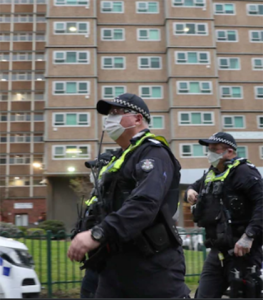CALD and blue collar workers most vulnerable to COVID
Two new studies have revealed aspects of the impact of the COVID-19 pandemic on CALD communities.
A report by the Scanlon Institute found that a key factor in the negative effect of the pandemic were unequal starting points, with some people more equipped than others to deal with the pandemic.
 Titled ‘Unanticipated consequences – The impact of the pandemic on Australia’s social cohesion’, the report found there was unequal access to technological resources. There was unequal knowledge of how to use technology and unequal levels of access to data.
Titled ‘Unanticipated consequences – The impact of the pandemic on Australia’s social cohesion’, the report found there was unequal access to technological resources. There was unequal knowledge of how to use technology and unequal levels of access to data.
“For instance, some people struggled to meet the requirements of homes schooling because of a lack of technological resources,” lead researcher Trish Prentice said.
“We also found there was unequal access to information due to differing levels of English proficiency or literacy in English or in their first language,” she said.
Ms Prentice said that the study showed that multicultural communities “could and did” mobilise themselves to meet needs generated during the pandemic.
“Community leaders and organisations took steps to organise to do what was needed to support their communities,” she said.
“One of the ways they did this was through the translation of COVID information. We know that government translations of information was often slow, confusing or inaccurate.
“We saw communities mobilise and disseminate the translations through their network.
“Another way communities reacted was in terms of food security. Communities and faith organisations stepped up to provide food to people in need,” Ms prentice said.
The study recommended that in responding to emergencies such as the pandemic into the future, Australia should “have the right boxes in place”.
“This means we need to have in place what communities need. We need to equip those who are best placed to support communities. And we need to listen to those best placed to understand what communities need,” the study said.
Another report by Catholic Health Australia, shows communities with higher blue collar and culturally and linguistically diverse (CALD) communities were vastly more susceptible to COVID infections in 2021 and remain at risk.
The report shows that the local government areas that are home to ‘battlers’ have been more adversely affected by the health and economic impacts of the pandemic
The report, titled ‘Unlucky in the Lucky Country: how COVID has exposed social inequity’ analysed a range of variable factors and found two stood out as key predictors of which LGAs recorded the most COVID infections: the number of blue-collar workers and the number of culturally and linguistically diverse (CALD) residents.
According to the research, every one percent increase in blue-collar workers per LGA was associated with an increase of an additional 848 COVID cases in Sydney and 895 in Melbourne.
Every one percent increase in the percentage of CALD residents per LGA led to an increase in 609 COVID cases in Sydney and 649 in Melbourne, the report said.
Catholic Health Australia spokesperson Nicole Clements said the huge inequity highlighted the need for urgent reform.
“In the early days of the pandemic, it was common to note that COVID was a brutal, but egalitarian, force,” Ms Clements said.
After nearly two years of living with the pandemic it’s safe to say the data and lived experience paints a vastly different picture,” she said.
“The most vulnerable, least affluent populations must be prioritised in future public health responses.”
This report claims that such prioritisation did not occur during the first three waves of the pandemic in Australia’s largest cities.
“Understanding how inequity helped COVID-19 to heavily impact certain LGAs while leaving others unscathed is vital if we are to build back better,” the report said.
“We need to understand ongoing socio-economic impacts and the likely consequences of policy measures in the event of future pandemics, resurgent coronavirus case numbers, or resumptions in restrictive public health orders,” it said.












